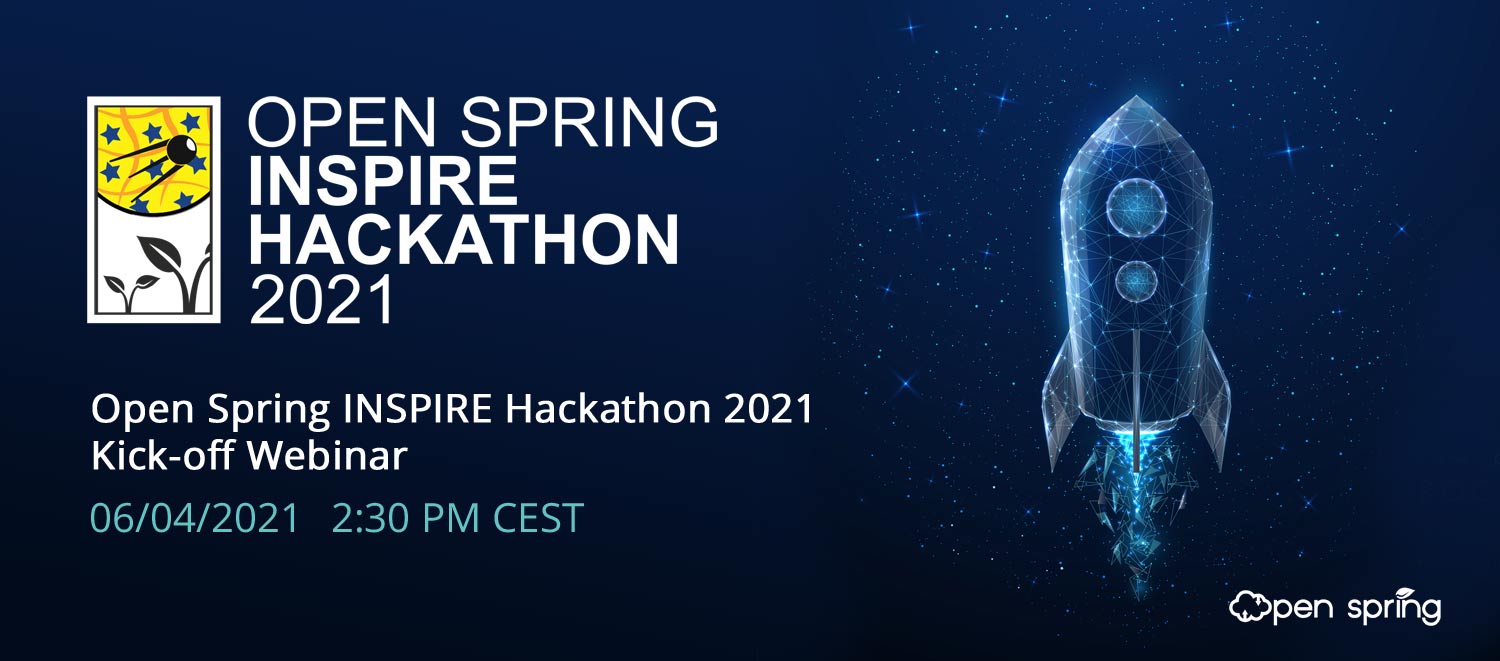The Open Spring INSPIRE Hackathon is about to start! Therefore, we are planning a kick-off webinar on 6th April at 2:30 PM CEST, where all 11 challenges will be introduced by their mentors in the form of 5-minute pitch! In addition to the objectives of the challenges and the introduction of mentors, in this webinar you will learn how to join the challenge you might be interested in and how such an INSPIRE Hackathon works.
The Open Spring INSPIRE hackathon 2021 (March – May) will be focused on developments and innovations in agriculture, the environment, transport, tourism, geospatial applications or remote sensing and GNSS.
In case of your interest, do not hesitate to register for this webinar HERE!
***The registration for the challenges is open! Check the table below, choose the challenge and register for the hackathon HERE***
Link to the webinar is as follows:
https://zoom.us/j/91789159796?pwd=cGJDZXZTdllYQ0d4TFEzTGErMCt5QT09
| CHALLENGE | PROJECT TITLE & DESCRIPTION | MENTOR |
|---|---|---|
| 1 | How to use and improve OLU 2.0.0 The aim of the Challenge is to verify and test the possibility of using the geographical database OLU 2.0.0 for various areas of human activity - spatial planning, modeling, visualization, but also in commercial applications - real estate, investment evaluation, etc. The aim is to support the use of OLU in various areas gather data for further development of the OLU database. | Karel Charvát, Kristýna Čerbová |
| 2 | Regional Atractiveness This challenge’s primary goals are to explore and develop different forms of simple, understandable, and tempting attractive communication of regional attractiveness assessment. The challenge results will help identify and visualise similarities and differences between various regions based on statistical data. The team should consider, test and experiment with multiple approaches that include but are not limited to index calculation, clustering or machine learning methods. | Karel Charvát, Otakar Čerba |
| 3 | Analysis of Drought Conditions for Selected Use-Cases Drought is a natural hazard that has significant impacts on the environment, society, and economy. In this challenge we will apply various drought indices to investigate the occurrence of drought conditions for several STARGATE use-cases in Europe. The aim of the challenge is to assess drought risk by applying drought indices to weather simulation models and earth observation data for selected use-cases. | Amit Kirschenbaum |
| 4 | Analytical map of traffic accidents in Czechia Set up an analytical map of traffic accidents in Czechia, taking advantage of the GLayer engine provided by InnoConnect. | Frantisek Kolovsky, Jiri Bouchal |
| 5 | SmartAfriHub III - African Agricultural Water Security The goal is to continue building the African Community to support SmartFarming in Africa. | Tuula Löytty, Markéta Kollerová, Karel Charvát |
| 6 | Analysis of Sentinel 2 and Sentinel 1 time series for the purpose of Agriculture This challenge aims at following: Comparison of different indices including developing web based environment for data comparison Time series crop classification testing different possibilities like transfering classification form one season to other or from one region to the other Analysis of dynamism of different indices in the field and comparison with other data like meteorological and climatic data Comparison of different phenology status inside of farm Comparison of phenology status of single crops between seasons Updating Land Use maps | Herman Snevajs, Iva Batrlova |
| 7 | Interactive collaborative data capturing at scale - technology and business models A MapWhiteboard is a technology that allows several users to work collaboratively “in” the same map, the way people do with documents in Google Docs or Office 365. The challenge for the hackathon is two-fold: The technical challenge for developers is to ensure the scalability of the current proof-of-concept to handle large-scale real-world user loads. To date, no benchmark has been established to determine the capacity and hardware requirements for the challenge. The business challenge for those who wish to transform tech into added value for society: How to capitalize on whiteboard technology For government, academia, business, individuals How can it be made into a cross-platform enabler (serve different tech silos, providers) What are the “killer” use-cases and applications for this technology How can this be offered as a service, licensing and IPR concerns - open or proprietary, on-premise, decentralized or SaaS | Runar Bergheim, Karel Charvát, Eliška Janošíková |
| 8 | AgroInfo Application Design of AgroInfo - (web-based) application gathering information from various sources into an integrated, easy to interpret environment. The outcome of the challenge should be a detailed analysis of needs, the definition of use-cases, and app wireframes that could be used as a basis for developing the web application. | Karel Jedlička, Frantisek Zadrazil, Pavel Hajek, Heřman Šnevajs, Jirka Valeš, Tomáš Andrš |
| 9 | Agrihub Slovakia Let's make Slovak agriculture smarter, sustainable and competitive. The aim of the challenge is to build a Slovak Agricultural Innovation Hub. | Petr Uhlíř, Hana Kubíčková, Radoslav Delina |
| 10 | Evaluation of OSM 4 purposes of Traffic Modelling The goal of our challenge is to evaluate the suitability of the OpenStreetMap street network for a traffic model creation, focusing on the quality of attributes (prohibited turns and road capacity mainly) using GEH Statistics, compared to available traffic measurements. | Karel Jedlička, Daniel Beran, Jan Martolos |
| 11 | From Smart Points of Interest towards sustainable Points of Interest The goal of the challenge is to create a robust, easily maintainable pipeline for OSM and other data resources to SPOI transformation and to find a sustainable business model for SPOI spoject. We will look at new methods of building SPOI, but the main focus will be on areas where SPOI can be used and how to integrate SPOI with other data and provide custom analysis for different stakeholders groups. We will look on synergis with such data sets like Open Land Use and other data sources. | Jan Macura, (Stein) Runar Bergheim |

